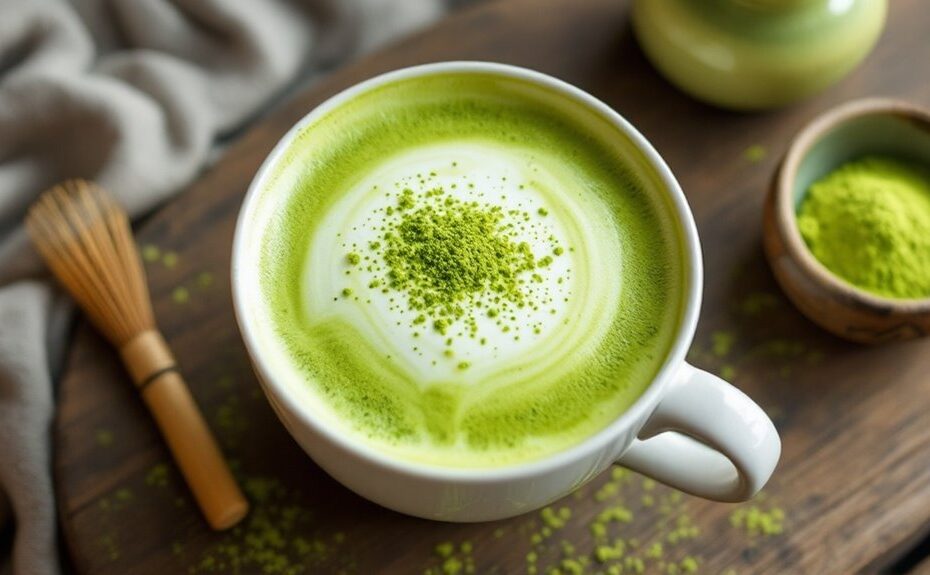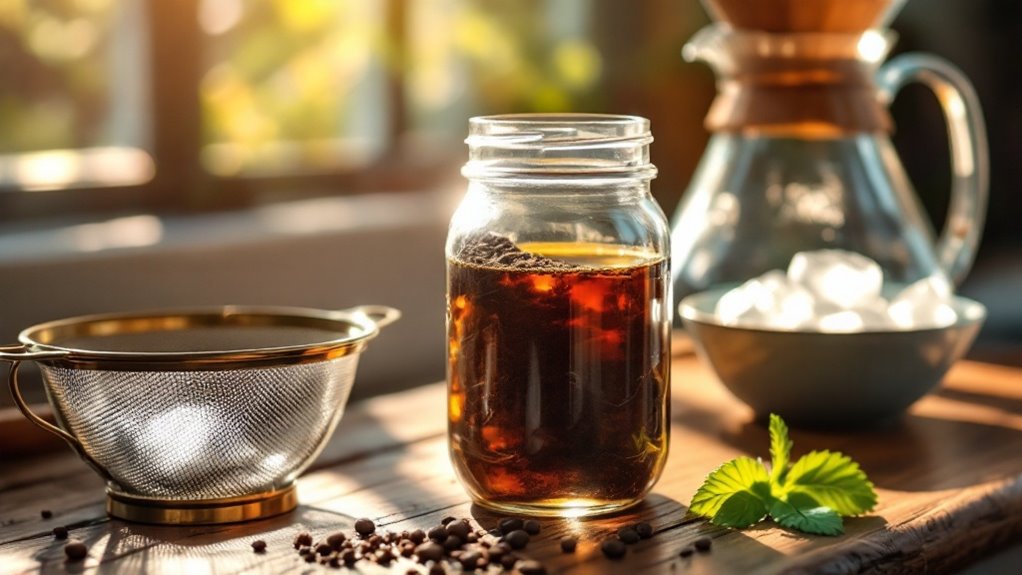



You might not realize that the quality of your matcha powder greatly impacts the flavor and texture of your latte. To start, you'll need ceremonial-grade matcha, a whisk, and a few other simple tools to create a smooth, frothy drink. The process involves sifting, whisking, and combining ingredients in a specific order to achieve the perfect balance. But there's more to it than just mixing—choosing the right milk, sweetener, and technique can elevate your matcha latte from good to exceptional. Discover how small adjustments can transform your homemade version into a café-worthy treat.
Key Takeaways
- Sift 1 1/2 teaspoons of ceremonial-grade matcha powder into a mug to prevent lumps.
- Add 1 tablespoon of hot water (175°F) and whisk vigorously until smooth.
- Stir in 2 teaspoons of honey or preferred sweetener to taste.
- Heat 3/4 cup of milk (dairy or plant-based) and pour into the matcha mixture.
- Whisk or froth to achieve a creamy, frothy texture and serve immediately.
Choosing the Right Matcha Powder
When selecting matcha powder for your latte, it's essential to pick the appropriate grade to achieve the desired flavor and quality. Ceremonial matcha, made from the first harvest of young ground green tea leaves, is the highest quality option. It has a vibrant green color, a sweeter taste, and a fine texture, making it ideal for lattes. Look for ceremonial-grade matcha powder with no added sugar and a bright green hue, as dull or brownish tones indicate lower quality. Store your matcha in an airtight container in a cool, dark place to maintain its freshness and nutrient content. Avoid culinary-grade matcha for lattes, as it's more astringent and bitter, better suited for baking or smoothies. Prioritize quality matcha for the best results.
Essential Tools for Making Matcha Lattes
To achieve a perfectly smooth and frothy matcha latte, you'll need a few essential tools designed to enhance the preparation process. Start with a bamboo whisk (chasen), which breaks up clumps in the matcha powder and creates a frothy texture. Use a fine mesh sifter to evenly distribute the matcha powder before whisking, ensuring a lump-free mixture. A matcha bowl (chawan) provides ample space for whisking and proper aeration. For convenience, a milk frother or handheld electric whisk can substitute the bamboo whisk. Heat water to 175°F (80°C) using a thermometer to avoid bitterness. These tools—bamboo whisk, matcha bowl, fine mesh sifter, thermometer, and milk frother—are indispensable for crafting a professional-quality matcha latte at home.
Step-by-Step Matcha Latte Recipe
With your tools prepared, you're ready to craft a matcha latte. Begin by sifting 1 1/2 teaspoons of matcha powder into a mug to avoid lumps. Add 1 tablespoon of hot water (175°F) and whisk vigorously until smooth. Stir in 2 teaspoons of honey or your preferred sweetener, adjusting to taste. Heat 3/4 cup of milk (dairy or plant-based) until hot but not boiling, then pour it into the matcha mixture. Whisk again or use a milk frother to achieve a creamy matcha with a frothy texture. Serve immediately to enjoy the best consistency and flavor of your homemade version. This matcha latte recipe guarantees a balanced, rich, and satisfying drink every time.
Customizing Your Matcha Latte
Customizing your matcha latte allows you to tailor the drink to your taste preferences and dietary needs. Start by adjusting sweetness with 1-2 teaspoons of honey or maple syrup. For a creamier texture, substitute regular milk with almond milk, oat milk, or coconut milk. Enhance flavor by adding a splash of vanilla extract or a pinch of cinnamon. For a richer consistency, use full-fat coconut milk or froth your milk before combining it with the matcha mixture. Control caffeine levels by adjusting the matcha powder quantity: use 1 teaspoon for a milder taste or 2 teaspoons for a stronger kick. Experiment with these variations to create a matcha latte that suits your unique palate and nutritional requirements.
Health Benefits of Matcha Lattes
While matcha lattes are a delicious treat, they also offer a range of health benefits that make them a smart addition to your routine. Matcha is packed with antioxidants, particularly catechins, which combat oxidative stress and reduce inflammation in your body. The high chlorophyll content in matcha supports detoxification by neutralizing toxins, promoting healthier skin. Matcha also contains L-theanine, an amino acid that enhances relaxation and mental clarity without causing drowsiness. Additionally, matcha boosts your metabolism and enhances fat burning due to its thermogenic properties. Unlike coffee, matcha provides a steady release of caffeine, offering sustained energy and focus without the jitters. Incorporating matcha lattes into your routine can support overall well-being while delivering a calming yet energizing effect.
Tips for the Perfect Matcha Latte
To achieve the perfect matcha latte, start by selecting ceremonial-grade matcha powder, as it delivers a vibrant green hue and a smooth, naturally sweet flavor without the bitterness of culinary-grade options. Sift 1-2 teaspoons of matcha powder into a bowl to remove clumps. Heat water to 175°F (80°C), then add 2 ounces to the bowl. Use a bamboo whisk to whisk the matcha in a W motion for 30 seconds until frothy. Froth your favorite milk separately, heating it to 140°F (60°C) for ideal texture. Combine the whisked matcha with the frothed milk, adjusting sweetness with honey or maple syrup for a perfectly sweet latte. This simple recipe guarantees a balanced, cafe-quality drink every time.
Storing and Preserving Matcha Powder
After perfecting your matcha latte, it's important to make sure your matcha powder stays fresh for future use. Transfer the matcha powder into an airtight container immediately after opening to prevent exposure to air and moisture, which degrade its quality. Store the container in a cool, dark place, such as a pantry or refrigerator, to maintain its vibrant green color and high chlorophyll levels. Avoid placing it near strong-smelling foods, as matcha's high chlorophyll content makes it prone to absorbing odors. For the best flavor and nutrient retention, use the powder within 1-2 months of opening. If you don't use matcha frequently, purchase smaller quantities to minimize prolonged storage and preserve its freshness. Proper storage makes certain your matcha retains its vibrant color and rich flavor.
Disclosure: As an Amazon Associate, I earn from qualifying purchases.



